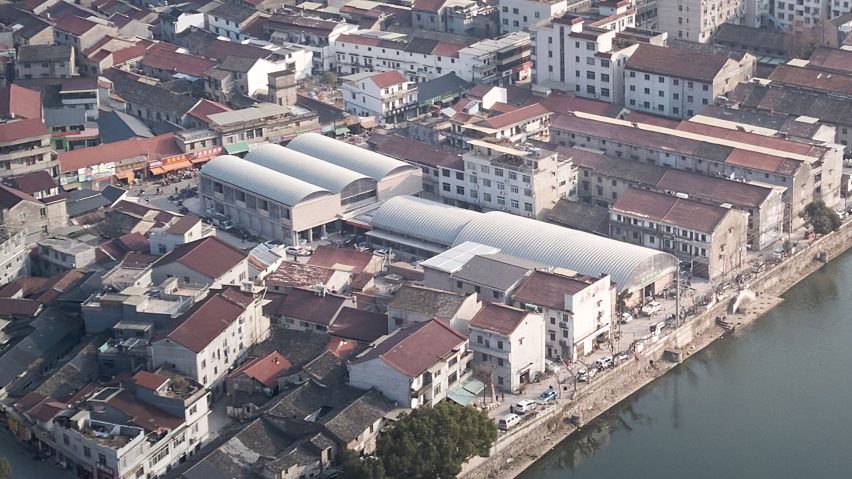Chinese studio Naturalbuild has completed the reconstruction of Xinfan Market in Huzhen Town, Zhejiang Province, with a design that aims to help facilitate visitors' return to wet markets in the wake of coronavirus lockdowns.
A series of easily customisable steel booths were designed for the new market in order to encourage the random adjustments that the Shanghai-based studio feels are key to the character and social role of these spaces.
The decision to demolish and rebuild Xinfan Market after 20 years in operation had been made prior to the outbreak of Covid-19, due to declining structural and sanitary conditions.
Once the project was underway, however, the outbreak of Covid-19 attracted global attention to these spaces, with early accounts – since disputed – claiming a wet market in Wuhan as the original source of the virus. Wet markets are markets that sell fresh meat, fish and produce, as opposed to dry markets, which sell goods such as electronics and clothes.
Naturalbuild's founder Yanfei Shui recognised the importance of improving these spaces, but was concerned about the impact the sudden closure or replacement of the markets would have the communities and farmers who rely on them.
"At the start of this project, we seriously doubted the necessity of full demolition and reconstruction," Shui told Dezeen.
"[Improving] hygiene conditions sounds like a good reason, but it also means the abandonment of a system...over 20 years of practice would disappear," he added.
During lockdown, the everyday ritual of visiting a market was overtaken by the practice of "community group buying", where a community leader purchases items in bulk to distribute directly to members of the community.
In the face of this change, Shui studied the existing marketplace for ideas on how to integrate some of the "chaos" and "randomness" that he felt was key to its character into the new market's design.
"Out of curiosity, we started our design process by keeping a record of how the old farmer's market operated in its seemingly chaotic sense," Shui told Dezeen.
"Individual retailers expanded the functions of their stalls beyond our imagination, random repairs reflect the simple and convenient pragmatism rooted in the lives of the people. It is this attitude that creates the worldliness of the farmer's market."
The new building occupies the same footprint as the old structure, with two concrete-framed market halls that are topped by arched roofs of corrugated steel.
A covered walkway between the two halls better connects the parallel streets to the north and south of the site, creating an important link between the town and the riverbank.
"The interior galleria, which connects the river bank and villa street from east to west, reorganises the surrounding commercial interface and improves the accessibility of the market," said the practice.
Informed by the study of the existing market, a "booth catalogue" of several welded steel structures was created, designed in a loose way to allow for easy customisation with lighting, signage, displays and storage.
The market's exterior is clad in blocks of local stone from Jinyun County, chosen to create a strong contrast with the industrial-feeling concrete structure and steel interior.
Shui hopes that the renovation will be an example of how marketplaces can "embrace future challenges" and remain a vital part of rural infrastructure.
"Nowadays, our discussions on the transformation of farmers markets are often superficial," Shui told Dezeen.
"In this context, we have to ask ourselves whether we can give up our aesthetic ambitions and really pay attention to restoring the system."
Previous projects by Naturalbuild include the transformation of a Shanghai warehouse that was once owned by a notorious 1930s underworld figure into an office and events space.
Elsewhere, Rui Mendes Ribeiro covered a Portuguese marketplace with a perforated canopy.
Photography is by Hao Chen.

